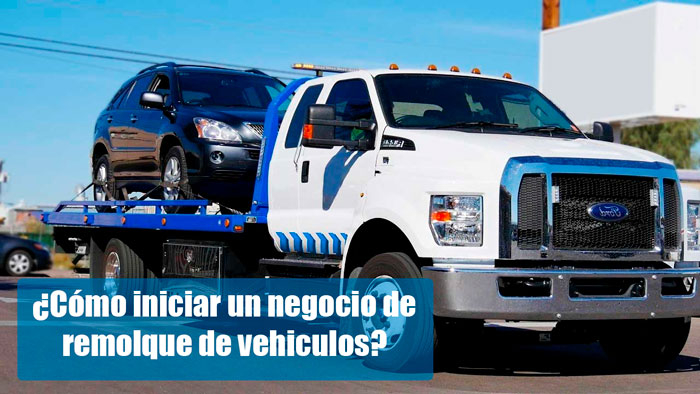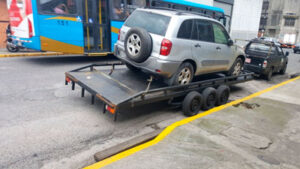Thinking of starting your own towing business? Not sure where to start? Anyone with a tow truck and a little business sense can run their own successful towing business.
There are some critical things to consider when making the decision to become a crane business owner. Do you want to be your own boss? Do you want to be solely responsible for the business, employees, expenses, etc.? Do you want to be on call 24 hours a day to build your business and make a profit?
With a little dedication, the right investment, and a little hard work, it can all be at your fingertips. Read on for tips and strategies to start your new business.
Licensing and Permitting Requirements for Towing services
To operate any type of business, you will need the appropriate licenses and permits issued by your state and local government. These ordinances and requirements vary by state and municipality.
you will need license to drive a tow truck, as well as a special liability insurance to cover anything that may occur. Liability insurance can be arranged as you begin to build your towing business. Insurance should cover yourself, your crane (s) and your customers. Your insurance broker will advise you on the minimum level of coverage required.
Contact your local government and secretary of state’s office to determine your specific requirements. If you plan to operate a seizure lot in conjunction with your towing business, you should also review local zoning ordinances and permits.
And finally, consider the type of driver’s license that is required for you and anyone else you plan to employ. Many cities and states require a CDL license for tow truck drivers and all of their employees must be properly licensed before making their first run.
Steps to start a flatbed trailer business
Find financing for your towing business
If you plan to run a single truck operation, financing may not be a big problem. A traditional bank loan should be enough to cover the cost of a truck and related equipment.
But if your plan includes a fleet of cranes and platforms, you should carefully consider your financing options. Although there are many financing options to choose from, be sure to work with a financing company that understands the truck and crane business.
Your business history will help the lender determine your financing requirements. If you’ve only been in business for a short time, you should be prepared with either good credit or some collateral to help with financing.
The type of vehicle you plan to buy (or even lease) will also make a difference in your financing options. For example, in most cases it is easier to finance a vehicle that is less than 10 years old.
Be frank and open with your lender so they fully understand your situation, your equipment needs, and your business cash flow. Cash flow for any business, especially a new or small business, is critical to maintaining operations and growing the business.
Consider your operating costs carefully when deciding how much you can pay for your towing equipment. Seek your finance company to help you create a financial package with a payment schedule that fits your budget and profit goals.
Promote yourself to attract more customers
The next challenge for your business is finding customers and understanding the local towing market. Building your customer base depends as much on building relationships as running a reliable towing service.
You can start by establishing relationships with local repair centers. Workshops typically maintain partnerships with towing companies and the companies, in return, discount their standard rate for repeat business. Visit garages in your area to get established and establish your business.
Another good clue for repeat business is your local police department. You can put your business on the accident responders list.
Contact car clubs in your area for additional towing opportunities. The towing fees for these clubs may be lower than the typical fee, but it’s a good way to start building a business.
Don’t forget the standard advertising options. A yellow pages ad, business cards, and your logo on the side of your truck go a long way toward winning direct paying customers. Set up a website where people can quickly find your business through a quick search.
Hire the right employees
For most people, this is the most daunting part of owning your own business. Hiring, supervising, and sometimes firing employees isn’t always easy, but it can be very rewarding to hire and lead a great team.
Finding employees with mechanical skills and towing experience probably won’t be very difficult. But technical skills aren’t the only thing to look for. You should be looking for an employee who represents you and the company well.
When interviewing potential employees, imagine how your clients will respond to each of the candidates. Imagine how the candidate will deal with customers stranded on the side of the road or how they will interact with local customers.
Overview of a towing business
There are two types of towing companies: towing with consent Y towing without consent. Consensual towing means that you will tow cars from the highways to the repair shops.
Non-consensual towing means that you will be towing cars that are parked where they shouldn’t be, or cars that have a lot of unpaid parking tickets. In that case, you will be working for business owners and law enforcement rather than individual car owners.
Only certain types of trucks have the ability to tow these vehicles and not many people have these vehicles. Owning one of these trucks is the first step.
If you decide that you want to get started, you’ll want to talk to local auto dealers and mechanics to start building relationships with them to use for their towing needs.
Skill set
- Good driving skills
- Ability to operate a crane
- Truck maintenance is an advantage
- Mechanical knowledge is positive
- Basic mechanical skills, like changing tires, increasing batteries is a must
- The ability to successfully use a car lock kit
- Know the area (s)
- List of common business skills
Approximate daily hours required: Most towing services run 24/7
Customer type: Local garages, the police department, repositories, and anyone else with a vehicle is a potential customer.
Necessary equipment, supplies and services
- Fully equipped trailer with accessories
- Flat bed
- Amber strobe lights
- Projectors
- Flares
- Traffic cones
- Jacks
- Battery lifter
- GPS
- Booster cables
- Lock kit
- Portable air compressor or air tank
- 5 gallon fuel tanks
- Tire Service Tools
- Work overalls
- Snowsuit for winter
- Fishing waders – so if you have a ditch full of water and need to pull out a vehicle
- Essential office equipment
Monthly expenses and operating costs to consider:
- Fuel
- Answering service
- Cell phone
- Repairs and Maintenance
- List of common business skills
Approximate minimum start-up cost
Essential equipment: This can cost anywhere from $ 150,000 to $ 2,000,000 depending on the area where you want to start. Permits and licenses can cost very different amounts depending on how urban the area is. This will also vary depending on the trucks you can find work with.
Suggestions and considerations
- Operators are advised to find easy to remember names and phone numbers so that people can easily call your business when they need vehicle towing services.
- It is always better to focus on your niche, since the market has grown a lot and it will be difficult to compete with others when you are starting out and do not have a specialized service.
- You need to be patient in securing a towing business license because obtaining a towing license can be difficult. Towing licenses are strictly regulated.
- You will have to learn how to use self-locking tools for people locking themselves for their car.
- Some operators work privately with individual businesses and property owners rather than with the public. In this capacity, they may not have to obtain a license, however, they may also have a more difficult time obtaining the necessary liability insurance.
- You may consider joining a franchise rather than operating completely independently. As part of a franchise, you will receive assistance in developing and advertising your business, which can give you a boost in building customers.
- You only need one person to perform this operation. This means, however, that you will have to be the one to go out on every job. Having an extra person to help you can allow you to have an occasional night off and service while you are sick.
- Most of your expenses will fall under maintenance, repair, the cost of fuel and communications, the rest is pure profit. Although keep in mind that every few years you will have to buy new trucks. Saving for the occasion will keep you in business, not doing so can put you out of business.
Advantages and disadvantages of a trailer business
Advantage:
- It pays off if you keep your equipment in good shape and have enough work, and keep your overhead low
- High demand even in a bad economy
- If you can get a AAA contract, you will have a steady stream of income. Although AAA contracts are not that profitable
- You can add vehicle storage for additional income
Disadvantages:
- You may have to deal with angry people whose vehicles are being towed
- You can be called in at all hours of the night to deal with vehicles that need to be towed and it can happen in any type of weather, making the job harder and less enjoyable.
- Accident calls take time and experience. When there is an accident you have to work fast to reopen the road
- It’s hard to find drivers who stay for hours
- AAA contracts keep you busy but the profit margin is low
- You will be susceptible to all kinds of weather
- You may have to remove vehicles from the ditch if it is very cold
- If you damage a car while towing you are responsible
- Hours are 24/7
- Insurance is expensive


